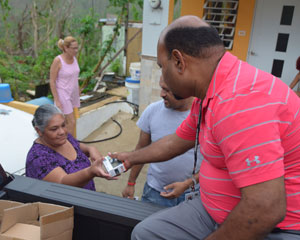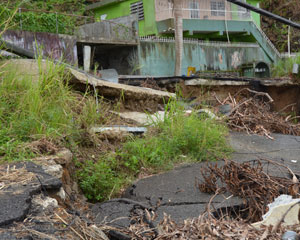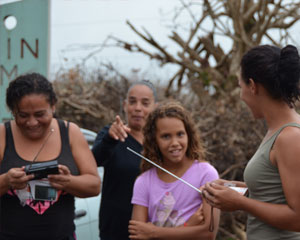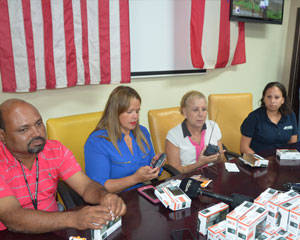[youtube https://www.youtube.com/watch?v=NtOpsVDnJzM&w=560&h=315]
Author’s Note: To view photos of my trip to Puerto Rico, click here.
I recently had the opportunity of a lifetime. I was asked by my employer – the National Association of Broadcasters – to travel to Puerto Rico to help distribute 10,000 battery-operated radios to people in hurricane-ravaged island and the Virgin Islands.
The idea for the radio hand-out stemmed from a meeting where President and CEO Gordon Smith asked: “What can NAB and our industry do to help?” NAB swung into action, purchasing, shipping and delivering the radios in just 18 days.
 I had seen pictures of the devastation in Puerto Rico, but nothing compares to seeing it in person. Most of Puerto Rico remained without power and drinkable water during our visit. Even in the Capitol of San Juan, power came almost exclusively from generators that had to be refilled with fuel or diesel daily by hand, sometimes every four hours. Police directed traffic at intersections.
I had seen pictures of the devastation in Puerto Rico, but nothing compares to seeing it in person. Most of Puerto Rico remained without power and drinkable water during our visit. Even in the Capitol of San Juan, power came almost exclusively from generators that had to be refilled with fuel or diesel daily by hand, sometimes every four hours. Police directed traffic at intersections.
People wait from six to 14 hours over three days to get tarps to cover the roofs of their houses. It’s common for people to wait in line for three hours to enter grocery stores, where bottled water is sold in rationed quantities. We saw 100-year-old trees uprooted, bringing concrete sidewalks with them and toppling power lines. We saw people living in cars or in tents on the beach. Recovery in areas away from the coast, where mountains and rain forests dominate the landscape, is occurring at a snail’s pace.
 Seeing the devastation drove home the need for reliable communication. Cellphone connections and Internet service are non-existent in many parts of Puerto Rico. Broadcast radio continues to connect people to critical information, five weeks after Maria made landfall. Residents in remote mountain areas and along the edge of the rain forest have limited information on accessing resources. My colleague, Louis Abanez, and I, visited several remote locations to distribute radios.
Seeing the devastation drove home the need for reliable communication. Cellphone connections and Internet service are non-existent in many parts of Puerto Rico. Broadcast radio continues to connect people to critical information, five weeks after Maria made landfall. Residents in remote mountain areas and along the edge of the rain forest have limited information on accessing resources. My colleague, Louis Abanez, and I, visited several remote locations to distribute radios.
People in 25 Puerto Rican municipalities, plus the U.S. Virgin Islands, received radios from our shipment of 10,000 devices. Donations from NAB, the National Alliance of State Broadcasters Associations (NASBA) and multiple U.S. radio companies covered the cost of this project.
We received enormous logistical support from Pat Roberts, head of the Florida Association of Broadcasters, and the Federal Emergency Management Agency (FEMA). Local Puerto Rican authorities ensured that the radios were distributed to those most in need. We also received Congressional support from Florida Sens. Bill Nelson and Marco Rubio, Congressman Darren Soto and Miami Beach Mayor Philip Levine.
 Crowds gathered for two events that Mayor Lornna Soto arranged in Canóvanas on October 18. It was touching to see the faces of Puerto Rican children light up when we handed them a new radio. People literally danced in the streets with their new radios.
Crowds gathered for two events that Mayor Lornna Soto arranged in Canóvanas on October 18. It was touching to see the faces of Puerto Rican children light up when we handed them a new radio. People literally danced in the streets with their new radios.
Rio Grande Mayor Gonzalez drove with us down narrow, winding, mountainous roads on the edge of El Yunque National Forest, where we delivered radios from the back of his pick-up truck. Residents flocked to us, particularly after dark when our vehicles provided the only lights for miles. We also walked to houses set back on dirt roads. Two hundred families personally received radios that day, with Mayor Gonzalez planning to distribute another 200.
On October 19, we delivered radios to Mayor Anibal Melendez in Fajardo, where challenges remain in reaching residents in the mountains. We also had a memorable experience in Loiza, a municipality with a median household income under $10,000. With cell phone ownership rare in Loiza, we knew that our radios were making a positive impact.
 Several mayors convened at a hotel near the San Juan Convention Center October 19 – 20 for meetings and to pick up supplies, including food, water, baby formula, diapers, and AM/FM radios. Word-of-mouth was key in making the mayors’ offices aware of our initiative. Some mayors only became aware of our radio distribution upon arriving in San Juan. Without cell service, they could not receive messages about our efforts.
Several mayors convened at a hotel near the San Juan Convention Center October 19 – 20 for meetings and to pick up supplies, including food, water, baby formula, diapers, and AM/FM radios. Word-of-mouth was key in making the mayors’ offices aware of our initiative. Some mayors only became aware of our radio distribution upon arriving in San Juan. Without cell service, they could not receive messages about our efforts.
Other municipalities that received radios included Aguas Buenas, Barceloneta, Camuy, Carolina, Cataño, Cayey, Cidra, Coamo, Guayanilla, Guayama, Gurabo Juana Díaz, Naranjito, Manati, Morovis, Ponce, San German, Toa Baja, Villalba, Vega Alta, and Yauco.
The Puerto Rico Association of Broadcasters is distributing 500 radios to residents. Executive Director José Ribas Dominicci and President Raul Santiago Santos continue to work tirelessly to ensure that stations have the resources they need to continue broadcasting.
This was an incredible trip and an honor to represent NAB.
